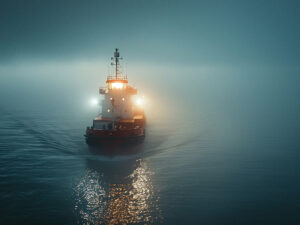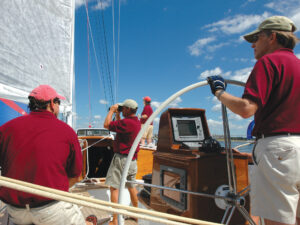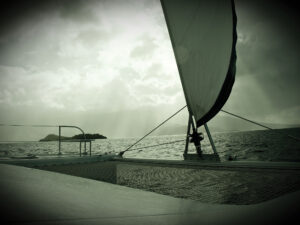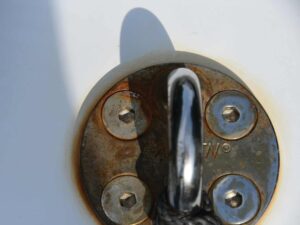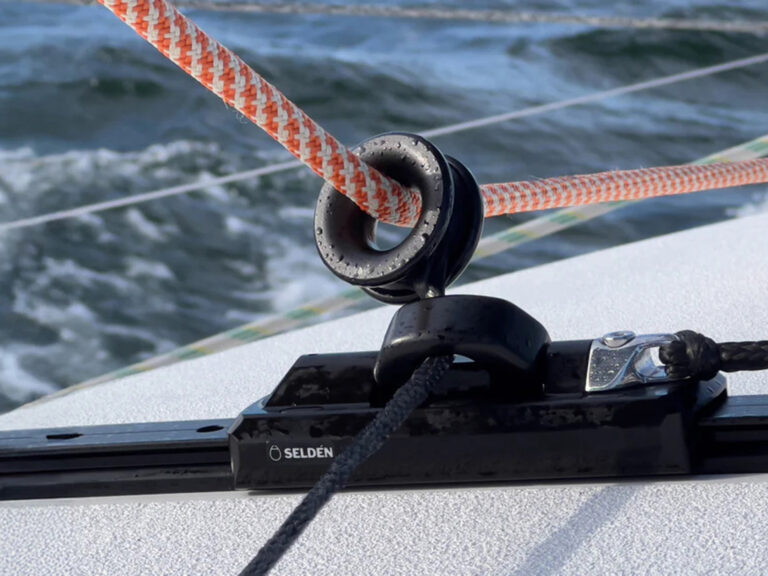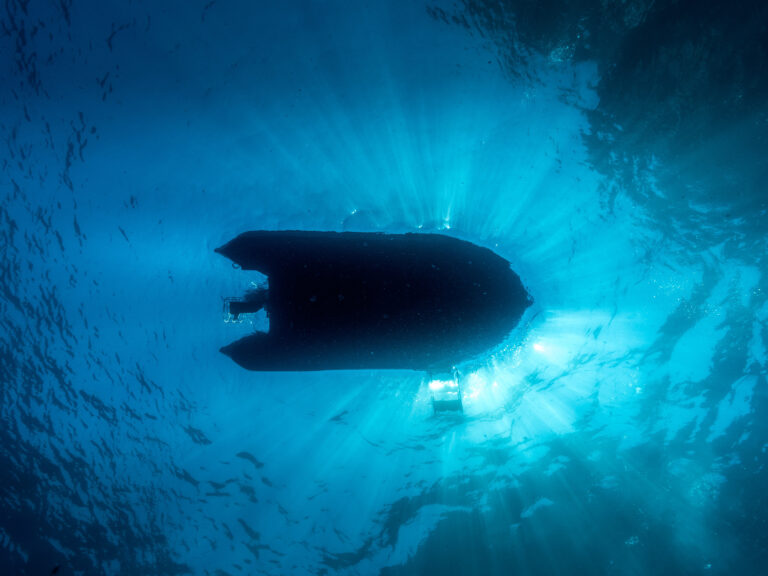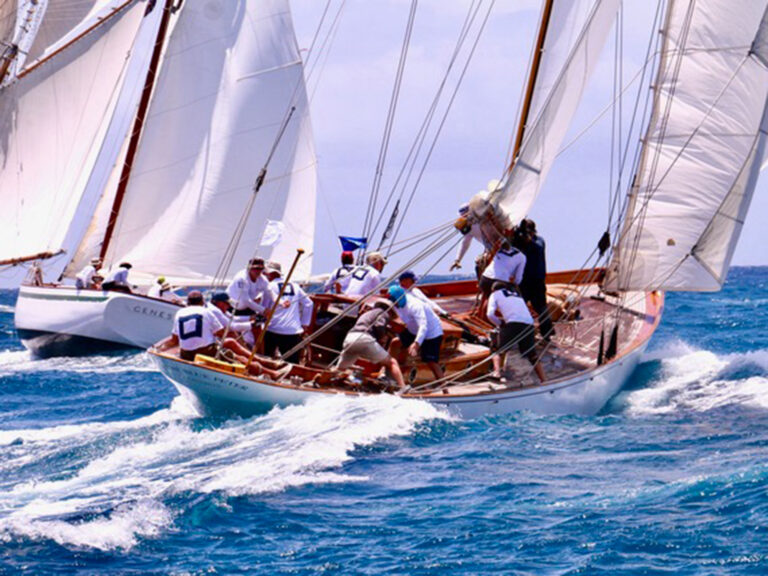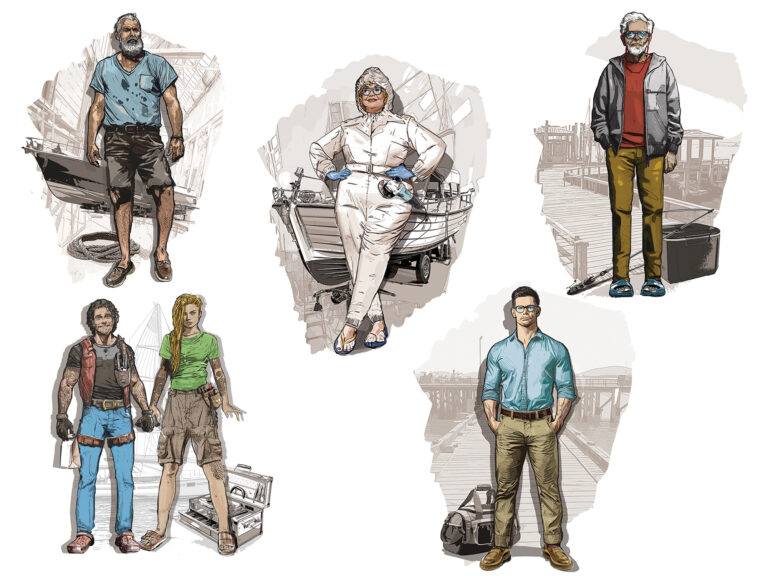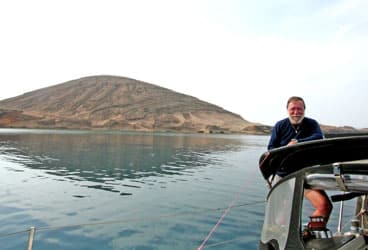
Fatty and the Red Sea
Like most sailors, I’m apolitical. I prefer to avoid the squabbles of dirt dwellers. Plus, as a long-term world cruiser, I’m usually a guest in a foreign country. I don’t believe a guest should criticize his or her hosts. If I don’t like a destination, I show it my transom. I leave. I vote with my keel.
One of the places that my wife, Carolyn, and I love dearly and keep coming back to is Southeast Asia. It’s a very exciting, very stimulating cruising destination. There are thousands of safe harbors, with the vast majority completely devoid of yachts. Most Asians are friendly, honest, hardworking, and nonviolent. The area is rich in diversity: the Buddhists of Thailand, the Muslims of Malaysia, the capitalists of Singapore, the Hindus of India, and the Chinese of Hong Kong are all vastly different people. Yet they manage to—mostly—get along just fine.
Another popular cruising area we love is Europe. It also teems with life, with passion, with history. Carolyn was deeply interested in anthropology when I snatched her away from academia. She’s still fascinated by Greek, Roman, and Turkish culture. Ruins continue to enthrall her. She’s mesmerized by ancient tombs and dusty works of art. Eastern Europe is history heaven for Carolyn.
Unfortunately, in between Southeast Asia and Europe is the dreaded Mideast. This is an unsettled, war-torn area where, in my humble opinion, racism and intolerance are glorified. I had no desire to visit Egypt, none. I had to, in order to transit the Suez Canal. This isn’t an ideal recipe for carefree, recreational cruising.
There are three major challenges to transiting the Red Sea area: the Somali pirates, the adverse winds in the northern Red Sea, and the regional politics.
Surprisingly, the threat from the sea pirates of Somalia turned out to be easier for us to deal with psychologically than the reality of the land pirates.
“I’ll drop you at the Suez Canal Authority dock in one minute, from the portside,” I told our final Suez pilot, curtly. “Be ready.”
“No, no, captain,” the pilot started hollering as he saw the dock approaching. “I must get off on pilot boat only. And you need to pay them baksheesh money, too!”
My heart sank. I caught sight of the swift, 55-foot pilot boat rushing between Wild Card and the dock. Its scarred, dented topsides were high and flared, making it impossible to come alongside without damaging our low-freeboard sloop. “Baksheesh!” the pilot boat’s Egyptian crew screamed at me as it slid alongside with gunning engine. “Hey, skipper! Baksheesh!”
“No more money!” I shouted. “I have no more money! None!”
This was the moment I’d dreaded. They’d intimidated me with their heavy-displacement vessel by getting closer and closer as they demanded money. But perhaps our pilot wasn’t that heartless. The surge from a wave pushed both vessels together. The pilot jumped. I yanked the helm over hard a’port—and at the same time I fended off the giant pilot boat as its starboard quarter slid into, and over, us. It was dangerous of me to do this, perhaps stupidly so, and it took all of my strength, but I managed to get us separated without damage to Wild Card.
There was a supply boat just ahead, and I rudely cut across its onrushing bow as its horn blared angrily. I now had some separation from the pilot boat and ducked behind an anchored freighter. I felt a surge of hope; I could see freedom ahead in the deep-blue waters of the Med.
A green fishing boat towing a long net chugged past. We slid along its starboard side and surreptitiously reached the Mediterranean Sea. We felt our bow dip and curtsy. We were free of the tyranny of Egypt. “Never again,” I said to Carolyn with a huge sigh of relief.
She concurred. “Rounding the Cape of Good Hope was 10 times easier,” she said with a shake of her head.
Now you may ask, dear reader, what tropic-loving, nearly penniless sea gypsies who hate cold weather are doing cruising northward into the expensive, chilly Med. The answer is the pitter-patter of tiny feet. That’s right, our daughter, Roma Orion, is preggers. We’re going to be (doting) grandparents. And so we decided to move our floating home closer to Europe, where Roma and her husband, Christian live, love, and play. “Excellent!” said our daughter when she heard the news. “That will make it easier for you to teach the kid to sail.”
I could almost see her beaming over the phone.
“And we’ve already acquired an infant-sized P.F.D. and a gimbaled bassinet for our first grand cruise together,” I told her. “And your mother’s so excited that she’s hyperventilating with joy!”
So we left Southeast Asia, transited the Indian Ocean, and even tiptoed our way through the Gulf of Aden, right under the noses of the napping Somali pirates. But the Red Sea transit presented an entirely different challenge from, say, the empty, wave-tossed Indian Ocean passage. Suddenly, the twin factors of politics and religion reared their ugly heads. Mideast war intruded. The U.S. State Department warned us, via our shipboard email, not to step ashore in Eritrea—just as we were about to clear into the specifically mentioned dangerous port of Massawa, where U.S. citizens were being tossed into jail without charge or trial. Sudan was under United Nations-imposed sanctions. And Egypt was, well, Egypt.
“Are you sure you’re ready for the culture shock?” asked Carolyn, who, after our 40 years of cruising together under sail, knows me better than I do myself. “The Med is filled with marinas and with rules, neither of which are your favorite things, Fatty.”
“Change is good,” I said. “We took our job as parents seriously, and I think we should be equally conscientious about raising our grandkids. They’ll need to know that everyone isn’t a shore hugger. They’ll need to learn the lessons of the sea. We’ll teach them—show them that there are alternatives to dirt dwelling and clock punching. After all, a floating playpen is the best playpen of all.”
The southern entrance to the Red Sea is a strait called Bab al Mandab; the name means Gate of Tears. It’s said that the wind, seas, and current will be against you no matter what time of year it is or which direction you transit. Our weather forecast called for a north wind; our plan was to anchor just outside, then wait for a wind shift before entering at morning.
Weather forecasting in the Red Sea is often less than accurate. Actually, that’s not true; it’s usually wrong. Or to put it another way, when the GRIBS are correct, it’s the exception to the rule. So we ended up not being able to anchor (it was a dead lee, in the southerly breeze); instead, we shot through the strait at midnight in windy, squally conditions.
Carolyn was down below, scanning our charts, watching our depth sounder, monitoring our A.I.S., and fine-tuning our radar. Suddenly, she said, “Small target, dead ahead, and very close!”
Visibility was poor, in heavy murk and blown spume.
“Within something like a quarter of a mile?” I asked.
“More like about a hundred yards,” she said casually.
Carolyn is always quite calm from the comfort of her nav station. It’s only on deck that the real world of close-quarters action is so scary to her. When I pointed our searchlight dead ahead into the blackness, it picked up a swaying Yemeni fisherman standing up in a small outboard fishing vessel; he was hauling an illegal surface net. The vessel was completely unlit. And I knew that type of net. Wild Card might sail right over it as it raked our stem or, if we were unlucky, catch it on her Max-Prop.
“Dog poop!” I said, or something similar, and jibed to starboard while releasing my permanently rigged boom preventer. I hadn’t gotten her squared away when Carolyn said with a yawn, “Similar targets, closing fast, starboard bow.”
This time there were two small, unlit fishing vessels; I hoped they were tending a different net. We were in the narrowest part of the channel. The current opposed the waves. They were all humped-up white horses. We were wallowing sickeningly in the troughs.
“Damn it!” I hissed and crash-tacked back to port. “It’s like a cautionary driver’s ed training film for yachts!”
“You’re doing fine,” Carolyn mused, as if polishing her nails in boredom. “It’ll open up soon. No worries, Fatty.”
Nothing fazes Carolyn. She’s always confident of her equipment and my abilities. I’m far more cautious. Together, my timid yin and her brave yang have managed to survive many a dark and stormy night at sea.
The Red Sea is a puzzle. We transited northward in March and April, which is considered prime time. The longer you wait, the harder the north winds blow as you close with the Med. So there’s a tendency to rush northward with good tactical reason. However, the marsa anchorages—lovely, lonely pots of water suspended between the vast emptiness of the desert and the unending combers of the Red Sea; marsa is an Arabic word for bay—are among the best, most stunning anchorages in the world. And the diving is superb. So you want to linger. But you’re always torn in the Red Sea, torn between hope and dread. This cruising area is full of surprises: I expected to hate primitive Sudan, and it turned out to be one of our finest stops ever.
Yes, we wanted a change from the tranquil tropics—and we certainly got it. Sailors of old always hugged the eastern shore of the Red Sea while working north to avoid the worst of the wind and adverse currents. But they currently shoot at you if you poke your bowsprit into some of the harbors in northern Yemen, and the Saudis don’t welcome yachts, to make an understatement. So politics plays a role in almost everything in the Red Sea.
Security is an issue as well. One of our first Red Sea anchorages was in the lee of Suyul, a small but dramatic island just off the larger Hanish island. We expected it to be deserted. It wasn’t. There was a makeshift, primitive army base perched precariously on the lofty cliff—whose army, we weren’t sure. As we attempted to anchor in the narrow shelf of shallow water below, the thin, tattered soldiers stared down at us with hard eyes. We waved gaily and sang out hello in a variety of local languages. They continued to stare down, to frown, to refrain from responding. So we put on our sail cover and nervously hid below.
The following day, we learned that at that moment there was a pirate attack on a southbound freighter not five miles to the west of us—within sight of the garrison.
The Red Sea isn’t a place to grow lax.
Our game plan was simple: Sail northward on a south wind, then tuck into a safe harbor on a northerly breeze. The problem was that each step north meant more and stronger nor’westerly breezes. By midway up the Red Sea, the wind was almost always directly, relentlessly on the nose.
This nor’wester became our implacable enemy.
Just to add spice, there were sandstorms. Our first took place in Khor Nawarat, in the lee of Bushy Island. With a deteriorating weather window, we pulled into the large, deserted bay that was completely surrounded by desert. The wind quickly rose to 35 knots, and the air turned orange—that’s right, orange, from all the suspended sand particles. Soon our decks were covered with sand. I noticed it clinging to the grease on our winches, windlass, and roller chocks. Our Monitor windvane’s delicate plastic bearings were clogged with the sharp, gritty abrasive. It gathered on the spreader tops and cascaded down when the rig shook in the wind. I couldn’t look up—sand was raining down into my eyes.
Each piece of running rigging became tubular sandpaper and began wearing away at whatever it ran through.
It made me ill just to think about it—a minute in the Red Sea is like a month of normal wear and tear. I never thought about it, but having your vessel sandblasted 24/7 is a rather expensive way to wait out a blow. Within a few days of arriving in the Red Sea, you want to get out. Now. Soon. Immediately.
But scattered amid the misery of the sand and the relentlessness of the headwinds are the breathtaking marsa anchorages. There were hundreds of them, each more beautiful, lonelier, and more visually stunning than the previous.
I’ve never loved the desert. I’ve read books written by those who have. I know that it’s possible to feel about the desert as I feel about the open sea, but the passion wasn’t in me. Then. Now it is. The sea and the desert are very similar—both empty and full, both dangerous and supportive, both welcoming and threatening.
Picture an empty sea alongside an empty desert—and a single pot of dazzlingly clear water punched into the coast. Our first lovely marsa in Sudan was like anchoring betwixt and between two completely different but almost identical worlds.
Forget time—nothing has changed here since the birth of man.
Animals frequently come upon the marsas after they’ve wandered across the endless desert sands, gradually dying of thirst. They see mirages and probably hallucinate water all the time. Here in the marsas, the shore is low. There’s a beach. The thirsty, wobbly creatures wander down, can’t believe their eyes, and can’t stop themselves. They gorge on the salt water. The water is delicious, for a moment or two. Then they cramp. Fall over. Paw the sand—frantic at first, then more feebly. Then they go dim.
Thus the beach was littered with corpses of donkeys, dogs, goats, sheep, and animals too far gone to identify.
Camels wander by. They prefer to avoid you, but failing that, taking a deep bite of your tender flesh is a delicious second option. Trust me, a spitting camel is best to be avoided if you don’t want to temporarily end up on the wrong side of the food chain.
Deserts are famous for both mirages and visions.
One morning, while I’m writing my On Watch column in the cockpit, I glance up. A human figure in billowing white is walking toward Wild Card from across the desert. He shimmers in the flickering heat waves. He is tall, very black, and carries a majestic staff. At the shore, he drops the staff and walks into the water with arms outstretched, and he only stops when the water is chest high. He’s close but utters not a sound. He’s staring at me intently, a combination of horror, fascination, and amazement on his beatific countenance.
I wait for him to do something. He does nothing. He’s a statue. I want to talk to him, befriend him, crack some nomadic jokes, but I’m scared. He’s frozen. I can’t tell if he’s breathing. Eventually, I glance at my watch and take a sip of my lukewarm tea. When I look back, he’s gone. Disappeared, without even a puff of smoke.
I grab the binoculars and scan a dozen miles of empty coast. Nothing. I can’t even make out footprints. I mentally kick myself for not snapping a photograph, but that would’ve killed the moment, a bigger crime than missing its recording.
A manatee levitates to the surface and makes kissing sounds with its bearded, macerating mouth. Pink flamingos flap past. The word “enchanted” pops into my reeling brain.
A few days later, we follow a flock of fishing dhows back through time and into Suakin, on the coast of Sudan: no electricity, no roads, no radio, no television. Just a market, a mosque, and some simple dwellings.
The first person I see is carrying a sword. Using pantomime, I convey to him that I want to buy one, and maybe a knife, too. Soon, groups of strangers are dashing up to show me their swords. By the following day, everywhere we go, we’re met with groups of young men rushing toward us with swords drawn.
It takes awhile to stop flinching, but we manage.
The villagers don’t know where we’re from, nor do they care. They sell us bread, fruits, and shriveled vegetables. We drink coffee together. They are poorer than dirt because they don’t have dirt, only non-fertile sand. Still, they survive, smile, laugh, and die.
One day, a young boy is kicked in the stomach by an animal in the market. He’s silent. He’s scared. He’s bleeding from the mouth. They rush him away on a cart drawn by a donkey. Later, I ask if they got him to a hospital in time. “Yes,” someone says sadly. “We got him home to his parents before he died.”
Life and death are hard in Sudan.
We spend a couple of weeks there and are the toast of the town. Swords in the hands of dark, turbaned men flash above our heads constantly. The local equivalent of a mayor tells us—I think—to keep an eye out for the landmark signs that, evidently, point out things of interest to the visiting tourist. Once we see one such sign up close, however, we realize we’ve misunderstood him. The signs don’t advertise landmarks—they warn of landmines!
Not all the fruits of Sudan are sweet.
The forceful northwest wind takes on a personality. We struggle against it. We claw. We power. We tack. Any progress is good. Sometimes we’re beaten back. Other times, we barely manage to maintain our place.
Yes, the nor’west wind is our enemy. We leave the safe harbor at 0200 and inch our way northward until 1000, when we seek the protection of the next marsa. Weeks go by. We measure our progress in miles, meters, and, eventually, inches. Finally the Red Sea is astern, and we begin tacking up the Gulf of Suez, playing the lifts, hiding from the currents, sneaking along the frothing reef edge. We forget all about our ultimate destination. We chip away at it; we take what we can. Our latitude increases. It gets colder.
We arrive at the modern port town at Suez. Supposedly, we’re in civilization again, but this characterization seems completely wrong to us. We’re surrounded by greedy jackals. We miss our warm, wonderful Suakin friends.
Our agent conspires with the measurer to overcharge us, then generously knocks off a few dollars when we loudly complain. We’re supposed to thank him. Everyone—every single person, employed or just laying about—at the Suez Yacht Club demands baksheesh—in addition to the ridiculously high dockage fees.
Egypt is surreal. I’m walking across a desert and a policemen approaches me on a camel. We stop. He dismounts, approaches, puts out his hand, and demands baksheesh. I angrily demand to know why he even thinks I’d give him money. He shrugs. This is how it is, he seems to say. I shake my head negatively, with vehemence, and stalk away.
The canal itself is a boring 100-mile-long drainage ditch. There’s not even a lock to go through to allow you to pretend all the abuse was worth it.
But we did it. We’re goal-oriented sailors. Some voyages are better than others, and the Red Sea, we learned, is a bittersweet ride.
With the rest of our lives before us, Carolyn hoisted the mainsail and we were roaring along under sail again. We were free of the land sharks. The Mediterranean Sea lay at our feet. I hooked up the Monitor self-steering gear, then Carolyn and I met in the middle of the boat on the starboard side for a much-needed hug.
“What do you hear?” I asked Carolyn after we’d kissed.
“The pitter-patter of tiny feet!” she said with a giggle.
Cap’n Fatty and Carolyn Goodlander are presently dividing their time between their boat in Turkey and their new grandchild in Amsterdam.

